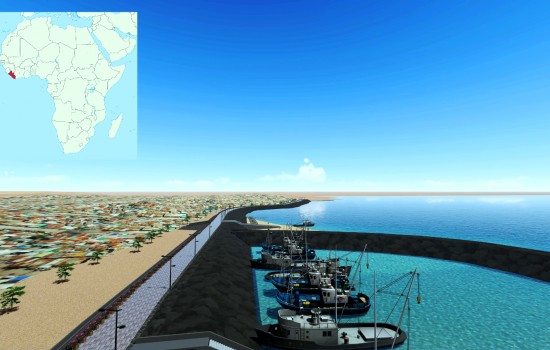Engineering Coastal Resilience: LHI's Sustainable Solutions for Protecting Liberia’s West Point
20th September 2024

The Liberia West Point Project
Lanka Hydraulic Institute (LHI) has a long-standing reputation for delivering high-quality hydro-engineering solutions globally. Our work across diverse continents continues to contribute to climate resilience, sustainable development, and the protection of vulnerable coastal regions. In Africa, our expertise has made significant impacts, and one of the most notable projects is the coastal protection work we undertook in Liberia, West Point. This project, funded by the United Nations Development Programme (UNDP) and the Green Climate Fund (GCF), aims to protect vulnerable coastal communities in Monrovia from the impacts of climate change, including resultant coastal erosion and coastal floods.
Project Background: Safeguarding the Heart of Liberia
Liberia, particularly the coastal region of Monrovia, is home to 60% of the country’s population. However, this area faces significant threats from sea-level rise and increasingly frequent and severe storms, which are exacerbated by climate change. Over the years, coastal erosion has displaced hundreds of households, with thousands more at risk if no mitigation measures are implemented. The Monrovia Metropolitan Climate Resilience Project (MMCRP) was born out of this pressing need, aiming to protect and strengthen the coastal defenses of West Point, one of the most exposed areas.
The primary focus of this project is the construction of a 1,050 meter long coastal revetment—a robust structure designed to resist coastal erosion and prevent further land loss. Complementary efforts include improving overall coastal zone management and promoting gender-sensitive livelihoods, particularly involving women, in the construction and maintenance of the coastal infrastructure. LHI was entrusted with the responsibility to conduct the hydro-engineering study and develop the detailed design for the coastal revetment, leveraging our vast experience in similar projects.
Objectives: Engineering for Climate Resilience
LHI's main objective for the West Point project was to design a coastal defense system that would provide long-term protection against erosion, flooding, and the impacts of climate change, while ensuring it was socially and economically viable. Our approach aimed to safeguard the community from the increasing risks posed by rising sea levels and storms, while also minimizing disruption to local livelihoods. The project scope included conducting comprehensive studies and data collection to inform the detailed design of the revetment, employing advanced numerical modeling to simulate wave, hydrodynamic, flooding and sediment conditions. LHI's state-of-the-art hydraulics laboratory, dedicated to physical modeling, played a key role in optimizing the design. The facility's capabilities enabled precise numerical simulations that were vital for validating the project's technical aspects. Additionally, LHI's other facilities for engineering design, field measurements, and construction supervision supported the development of a detailed construction plan that integrated sustainable practices and community involvement. Through this holistic approach, LHI aimed to deliver a robust and adaptable solution that not only protects the coastline but also promotes economic and social development in the area.
Outcomes: Building a Resilient Future for West Point
Our comprehensive hydro-engineering study, backed by numerical and physical modeling, confirmed that the proposed design would not only protect West Point from coastal erosion but also prevent flooding in the surrounding areas. The wave and sediment transport models validated that the coastal defense structures would maintain stability even under extreme conditions, ensuring long-term resilience against climate change.
The project also brings social benefits to the local community. By involving local labor—particularly women— in the construction process, it creates job opportunities and fosters local ownership of the infrastructure. The promenade, with its green spaces and recreational features, enhances the quality of life for the residents of West Point while ensuring the protection of their homes and livelihoods.
LHI's Global and African Projects: A Legacy of Engineering Excellence and Future Coastal Protection and Climate Resilience Initiatives
Lanka Hydraulic Institute (LHI), founded in 1984 by the late S.R. Amarasinghe, has become a global leader in coastal and inland water engineering, completing around 600 consultancy projects. LHI’s global footprint includes significant projects in France, Belize, Oman, Iran, UAE, South Korea, Brunei, and 35 in South Asia, including India, Maldives, and Bhutan. In Africa, LHI has successfully undertaken projects in Eritrea, Algeria, Mauritius, Rwanda, Reunion Island, and Senegal, further establishing our expertise in diverse and challenging environments.
The Liberia West Point project exemplifies LHI’s commitment to addressing critical coastal challenges in Africa by blending advanced engineering with community-focused solutions. This is the 17th project on the African continent, reflecting LHI’s growing focus on climate resilience and sustainable development. Moving forward, LHI is dedicated to expanding its work across Africa, protecting vulnerable coastal regions from the escalating threats posed by climate change.

